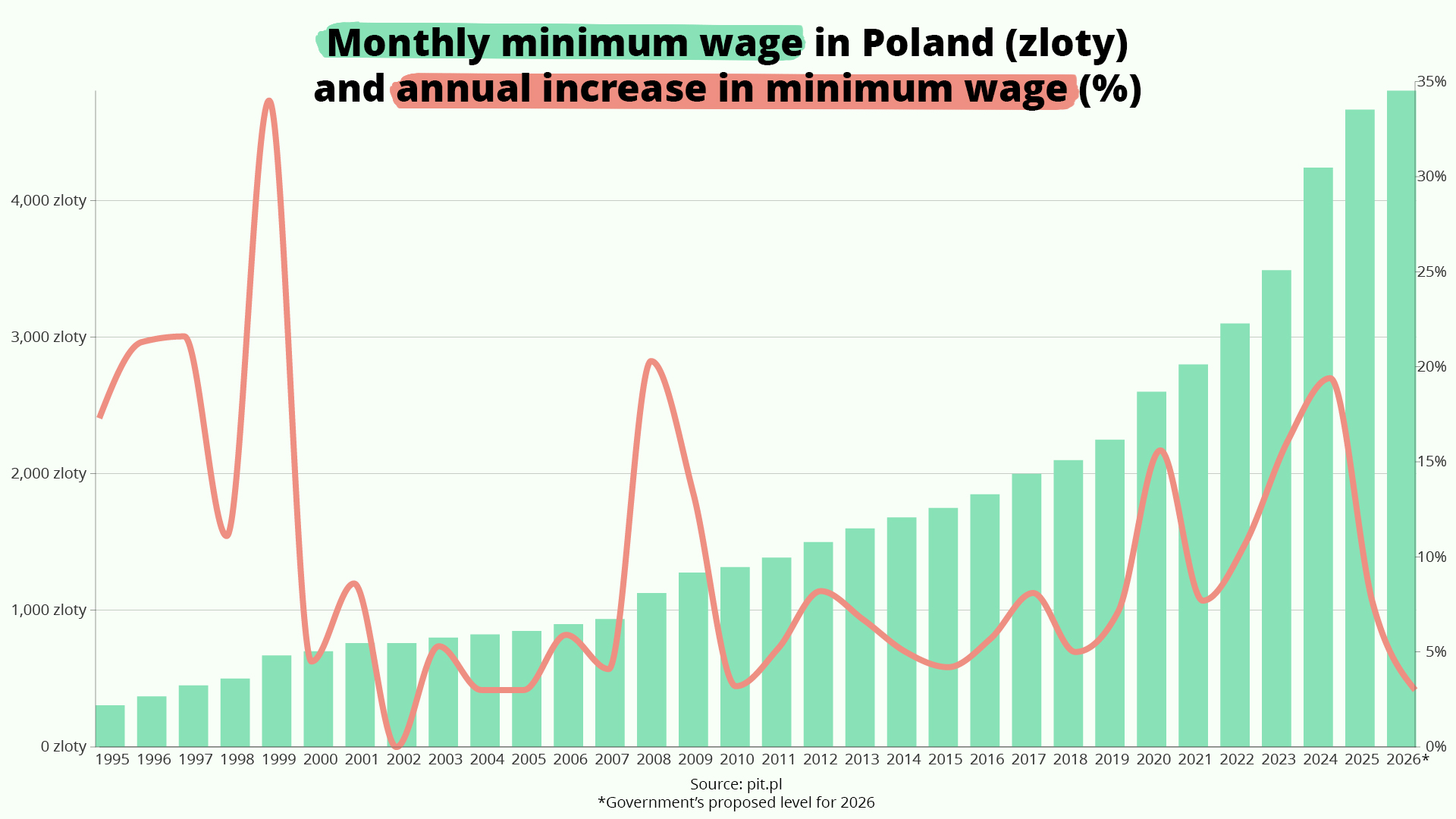Keep our news free from ads and paywalls by making a donation to support our work!

Notes from Poland is run by a small editorial team and is published by an independent, non-profit foundation that is funded through donations from our readers. We cannot do what we do without your support.
Poland’s government has proposed a 3% increase in the minimum wage from January 2026, raising it to 4,806 zloty (€1,124.60) per month and 31.40 (€7.35) zloty per hour.
The planned hike marks a much smaller rise than in recent years, when the minimum wage surged by double digits to counter soaring inflation. It would also be the smallest minimum wage increase in two decades.
Trade unions criticised the proposed increase as inadequate, while business groups described it as a “compromise” but warned that the minimum wage has been rising too quickly in Poland.

At present, Poland’s gross minimum wage stands at 4,666 zloty per month and 30.50 zloty per hour. The proposed rise aligns with an earlier recommendation from the finance ministry, but falls short of suggestions from the family and labour ministry (5,020 zloty) and trade unions (5,015 zloty).
The Social Dialogue Council (RDS), which includes representatives of workers, employers and the government, now has until 15 July to negotiate a counteroffer. If no consensus is reached, the government will finalise the new minimum wage by 15 September. Legally, the final figure cannot be lower than the government’s initial proposal.
Unions say the proposal fails to protect real wages amid still-elevated living costs. “This is a big disappointment,” Piotr Ostrowski, president of the All-Poland Alliance of Trade Unions (OPZZ), told the Polish Press Agency (PAP),
Ostrowski said that the union’s proposed increase is economically justified and based on forecasts for average wage growth. “And that’s exactly the increase we’re calling for,” he added. “We want minimum wages to rise in line with average wages.”
Employers were also not fully satisfied with the proposal. A joint statement from business groups, including the Lewiatan Confederation and Employers of Poland, said the government should maintain the existing formula for calculating the minimum scope of the increase, which would mean a rise of around 50 zloty per month.
Jacek Męcina, an advisor to Lewiatan’s board, described the government’s move as a “compromise”. “Three percent growth is much less than in previous years and is more related to inflation…so it is protection of the real value of the minimum wage,” he told PAP.
Meanwhile, Agnieszka Majewska, spokesperson for the Commissioner for Small and Medium-sized Enterprises, warned in a letter to Prime Minister Donald Tusk that rapid minimum wage hikes have raised concerns among business owners.
“Rising labour costs are a major barrier to doing business,” she wrote, quoted by news website Gazeta.pl. She added that increases are often out of step with the financial capacity of Polish firms. She cautioned that this could lead to job losses over time.
Pracodawcy nie są zachwyceni wysokością podwyżki płacy minimalnej proponowanej przez rząd w 2026❌
❎Racjonalny byłby wzrost minimalnego wynagrodzenia, by utrzymało się na poziomie 50% przeciętnej płacy – prof. Jacek Męcina, doradca zarządu Lewiatana
➡️ https://t.co/Gs3pUhwHLU pic.twitter.com/gw4njZ0uyE
— Konfederacja Lewiatan (@Konf_Lewiatan) June 12, 2025
The minimum wage has surged in Poland in recent years, making it one of the fastest-growing among EU countries. Since 2001, it has increased nearly sevenfold, with real growth averaging 4.6% annually.
Over the past decade alone, real gains have reached 5.3% per year. In purchasing power terms, the minimum wage is now roughly three times what it was in 2001, and 70% higher than in 2015, reported financial news outlet Money.pl.
Poland’s minimum hourly wage recently surpassed the US federal minimum for the first time (though most individual American states have their own, higher minimum wage).
The minimum wage is currently equivalent to approximately 52% of Poland’s national average salary (8,962 zloty). The labour ministry is preparing a bill that would raise this share to 55% in the medium term, aligning it more closely with targets set in draft EU directives. A decade ago, the ratio stood at just 45%.
Poland's minimum wage has risen above the federal minimum wage in the United States for the first time.
For more, read our full report: https://t.co/osmLcATh84 pic.twitter.com/hf0lrZMgL1
— Notes from Poland 🇵🇱 (@notesfrompoland) January 3, 2025
The steady rise in Poland’s minimum wage has accompanied decades of economic expansion, though recent years have been marked by volatility and low unemployment.
A pandemic-induced slowdown and the economic fallout from Russia’s full-scale invasion of Ukraine pushed inflation to a peak of 18.4% year-on-year in early 2023, prompting a record 21.5% increase in the minimum wage in January 2024.
Although inflation has since receded, it remains stubbornly above the central bank’s goal of 2.5% (+/- one percentage point). In May, Poland’s annual inflation rate was at 4%.
Poland's unemployment rate of 2.6% in January is the lowest ever recorded in the country by @EU_Eurostat and was the joint-lowest that month among all EU member states
For more, read our full report here: https://t.co/eP5A9JT4eg pic.twitter.com/A9oHu2zLZ6
— Notes from Poland 🇵🇱 (@notesfrompoland) March 7, 2025

Notes from Poland is run by a small editorial team and published by an independent, non-profit foundation that is funded through donations from our readers. We cannot do what we do without your support.
Main image credit: Liliana Drew / Pexels

Alicja Ptak is deputy editor-in-chief of Notes from Poland and a multimedia journalist. She has written for Clean Energy Wire and The Times, and she hosts her own podcast, The Warsaw Wire, on Poland’s economy and energy sector. She previously worked for Reuters.



















